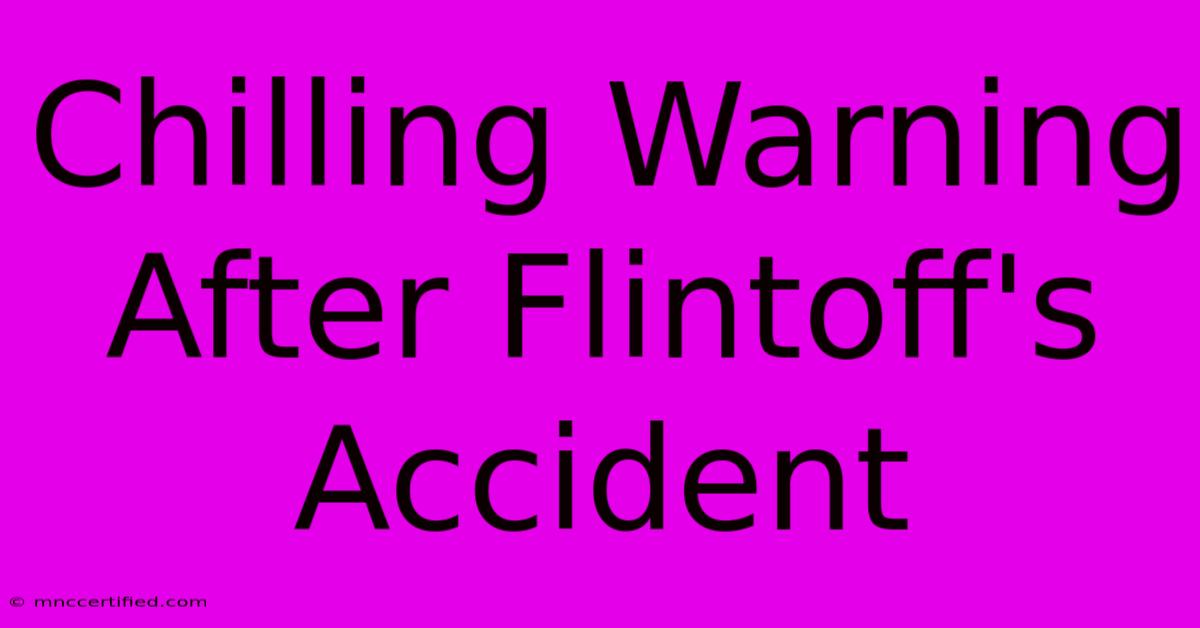Chilling Warning After Flintoff's Accident

Table of Contents
Chilling Warning After Flintoff's Accident: The Urgent Need for Improved Safety in Television
The recent accident involving former cricketer Andrew Flintoff on the set of Top Gear has sent shockwaves through the entertainment industry and sparked a crucial conversation: the urgent need for improved safety protocols on television productions. Flintoff's near-fatal crash highlights the inherent risks involved in stunt-based shows and demands a thorough reassessment of safety measures. This chilling incident serves as a stark warning, prompting calls for increased scrutiny and stricter regulations.
The Flintoff Accident: A Wake-Up Call
Flintoff's accident, which involved a high-speed crash during a vehicle segment, resulted in serious injuries. While the specifics are still under investigation, the incident underscores the potential dangers faced by both celebrities and production crews working on such programs. The severity of his injuries serves as a stark reminder that even experienced professionals are vulnerable in high-risk environments. This isn't merely about individual responsibility; it's about systemic failures that need addressing.
Beyond Individual Responsibility: Systemic Issues in TV Production Safety
While individual accountability is important, focusing solely on this aspect neglects the larger systemic issues at play. The Flintoff accident raises questions about:
- Adequate Risk Assessments: Were thorough and comprehensive risk assessments conducted before filming the segment? Were all potential dangers identified and mitigated effectively? A robust risk assessment process is paramount in high-risk productions.
- Safety Protocols & Training: Were appropriate safety protocols in place? Did the crew and participants receive adequate training on the specific risks associated with the stunt? Comprehensive training is crucial to ensure everyone understands and adheres to safety guidelines.
- Equipment Maintenance and Oversight: Was the vehicle involved in the accident properly maintained and inspected? Were there adequate safety mechanisms in place to prevent or mitigate the impact of a crash? Regular maintenance checks and rigorous oversight are essential to minimize equipment-related risks.
- Stunt Coordination & Supervision: Was the stunt properly choreographed and supervised by experienced professionals? Was there adequate oversight throughout the entire process to ensure the safety of all involved? Skilled stunt coordinators are vital for safe execution.
- Emergency Response Preparedness: Was an effective emergency response plan in place? Was the response time appropriate? Quick access to medical care is critical in such high-risk situations.
Lessons Learned & Future Implications: Towards a Safer Television Industry
The Flintoff accident is not an isolated incident. Many television productions, particularly those involving stunts or hazardous activities, carry inherent risks. This event, however, should serve as a catalyst for significant change. We need to:
- Strengthen Regulatory Oversight: The broadcasting regulatory bodies need to strengthen their oversight of television production safety protocols. This includes stricter enforcement of existing regulations and the development of more comprehensive guidelines specifically addressing high-risk activities.
- Independent Safety Audits: Independent safety audits should be mandatory for productions involving high-risk activities. This provides an external perspective and ensures that safety protocols are being implemented effectively.
- Increased Transparency and Accountability: Increased transparency in reporting safety incidents and holding production companies accountable for any negligence is crucial to fostering a culture of safety.
- Industry-Wide Collaboration: Collaboration across the television industry is essential to share best practices and develop universally accepted safety standards.
The chilling events surrounding Andrew Flintoff's accident serve as a potent reminder of the inherent dangers in television production. It's a wake-up call that demands immediate action. Only through a comprehensive overhaul of safety protocols, strengthened regulations, and increased industry collaboration can we hope to create a safer environment for everyone involved in making television. The focus must shift from simply reacting to accidents to proactively preventing them. This is not just about protecting celebrities; it’s about protecting the entire production team and ensuring that the pursuit of entertainment doesn't come at the cost of human life.

Thank you for visiting our website wich cover about Chilling Warning After Flintoff's Accident. We hope the information provided has been useful to you. Feel free to contact us if you have any questions or need further assistance. See you next time and dont miss to bookmark.
Featured Posts
-
Red Sea Friendly Fire Two Navy Pilots Killed
Dec 23, 2024
-
Everton Chelsea Match Live Blog And Highlights
Dec 23, 2024
-
Death In Paradise Tackles Savior Narrative
Dec 23, 2024
-
Commanders Vs Eagles Game Info
Dec 23, 2024
-
Dubois Demands Usyk Rematch After Win
Dec 23, 2024